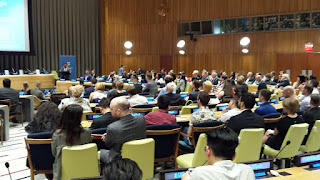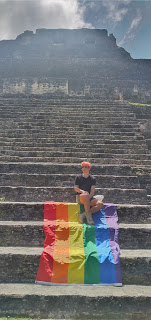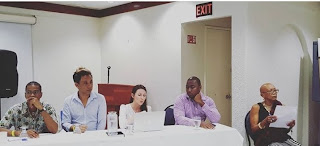Anglican bishops reject same-sex marriage
Friday, April 26, 2013
THE leadership of the Anglican Church in the West Indies has issued a
firm rejection of same-sex marriage and has urged Caribbean Governments
to resist attempts at compromise from outside the region.
In a draft provincial statement on same-sex unions issued yesterday, the
House of Bishops and Standing Committee of the Church in the Province
of the West Indies said that they were aware that Caribbean political
leaders were being subjected to pressures from nations and institutions
from outside the region.
"Frequently they are pressured to conform to the changes being
undertaken in their redefinition of human sexuality and same-sex unions,
under threat of economic sanctions and the loss of humanitarian aid,"
the bishops said.
"We urge our leaders of government and of civil society, as well as the
people of our nations, to resist any attempt to compromise our cultural
and religious principles regarding these matters.
"The dangling of a carrot of economic assistance to faltering economies
should be seen for what it is worth and should be resisted by people and
government alike," added the bishops, who are meeting
in Barbados.
They said that during their deliberations they had taken note of trends
within countries of the developed world and international forums in
which these countries exercise a controlling interest in which matters
related to human sexuality have been elevated to the level of human
rights and are being promulgated as positions which must be accepted
globally.
"Frequently, failure to conform by developing nations, like our own,
results in the threat of various sanctions, including the withholding of
economic aid," the bishops said.
"More specifically, there is a redefinition of gender to accommodate
gay, lesbian and transgendered people, and the creation of a plurality
of definitions which leaves the issue of gender to self-definition,
thereby dismissing traditional definition of male and female," they
argued.
"Additionally, there is the passage of legislation among a number of
metropolitan nations whereby marriage is defined as a human right in
which any two persons may be joined, inclusive of persons of the same
sex."
As such, they said, the "marriage" of persons of the same sex is
justified as a human right on the basis of marital equality with
heterosexual unions.
The bishops said that while they acknowledge that there is a diversity
of family patterns within the Caribbean, "these have been understood by
our people to be between a man and a woman, whether defined in terms of
the natural order of creation or on the basis of religious beliefs which
see these grounded in the purpose of God".
They pointed to the Pastoral Statement from the House of Bishops of the
Church of England in 2005 which defines marriage as "a creation
ordinance, a gift of God in creation and a means of His grace. Marriage,
defined as a faithful, committed, permanent and legally sanctioned
relationship between a man and a woman, is central to the stability and
health of human society. It continues to provide the best context for
the raising of children".
The bishops also said that characteristic of our patterns of
cohabitation and family life is the notion that such unions are based on
a relationship between a man and a woman.
"The idea of such unions being constituted by persons of the same sex
is, therefore, totally unacceptable on theological and cultural
grounds," they insisted.
The bishops said that while they recognise that the church's mandate is
informed by pastoral and doctrinal concerns and in drawing the attention
of the faithful to the source and purpose of marriage, and in
solemnising such unions, they accept that governments have the
responsibility of providing the kind of legal framework for protecting,
but not defining, this most basic social institution on which the
stability of society and the socialisation of its members rest. They
also appreciate that governments must protect the members of such unions
against abuse and injustice.
However, they pointed out that the threat and use of economic sanctions
are not new experiences to the region's peoples, "neither is the claim
to a superior morality convincing for peoples who have known the
experience of chattel slavery in our past.
"While claiming to invoke human rights as the basis for such imposition,
we submit that the same principle must allow us the right to affirm our
cultural and religious convictions regarding our definitions of that
most basic of social institutions — marriage."



Comments
Post a Comment